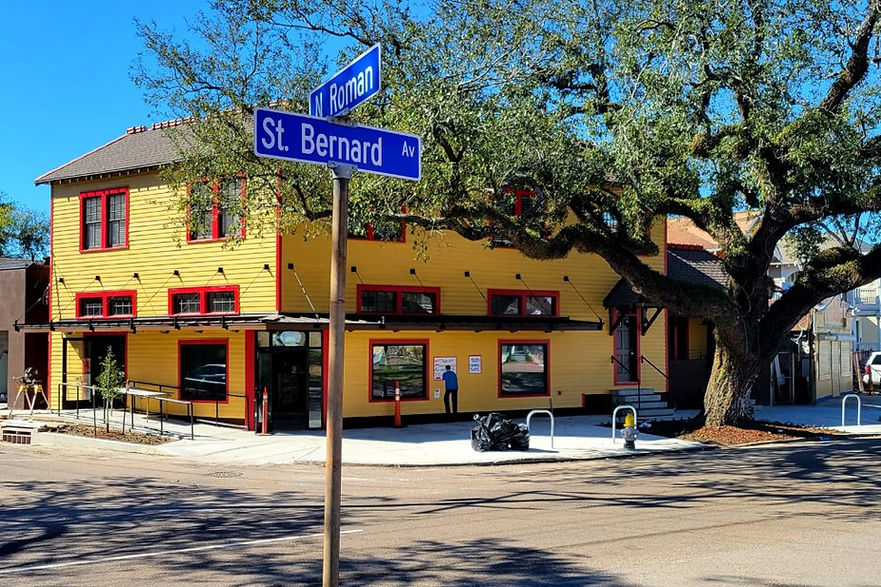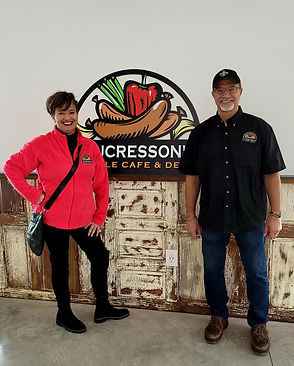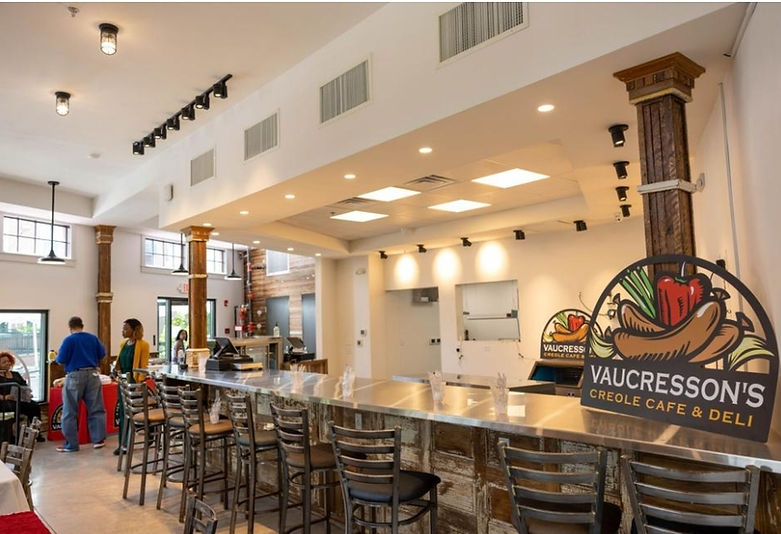
Since 1899, the Vaucresson family has held ground in the heart of New Orleans’ Creole Seventh Ward commercial corridor. Robert Levinsky Vaucresson was the family forebear who started as a butcher in the Old St. Bernard Meat Market which was located on the corner of St. Bernard and N. Claiborne Avenues. In 1933, the City opened a new market with stalls equipped with refrigerated units adjacent to the old one in the location where the Circle Food Store now stands.
In 1949 Robert L. Vaucresson leased a building blocks down St. Bernard Avenue at N. Johnson Street . Working owner's hours, he made sausage, sold product, and transformed just a stall in a market into a family run and operated company. Out of his and his wife Julia's six children, their son Robert Anthony “Sonny” Vaucresson joined the family business in 1939, taking full ownership when his father died in 1956.
As the business's third generation proprietor, Sonny had the vision to take his family's recipes beyond the production shop and marketplace and opened Creole Café at 624 Bourbon Street in the French Quarter in 1956. Recognizing the change in customer demographics and business atmosphere of the era, he built a restaurant that tapped into new customer and tourists' desire for authentic experiences. Vaucresson’s Creole Café offered exactly what they were hungry for: owned and operated by an Afro-Creole family with New Orleans roots going back generations that served a menu of home-style Afro-Creole dishes such as panneed veal and red (not brown) jambalaya; a combination of the two was the signature dish of the Vaucresson family. One could step into the Cafés big, dark paneled dining room or the courtyard away from the cacophony of Bourbon Street and enjoy a breakfast of homemade chaurice (a hot link sausage) omelette with red beans and rice, calas (fried rice cakes) or grillades. Deliciously distinctive meals in an environment that was undiluted New Orleans.
Unfortunately, New Orleans, like many American cities in the 1970s, lost a large portion of its customer base to commerce being developed outside of urban centers. As he did in the 1950s, Sonny adjusted the Vaucresson business plan so that his grandfather's company would remain viable in the changing economy. Continuing sales with established customers like Dooky Chase's (established in 1941, it remains the premiere African-American owned restaurant in New Orleans), he also engaged new outlets that emerged during this downturn, helping him to sustain the Vaucresson brand and meet people's demand for high quality Creole sausage. In addition to being one of the first asked to serve po'boys at the first New Orleans Jazz and Heritage Festival in 1970, Vaucresson's branched out into grocery outlets of Schwegmann's and Winn Dixie and sold product to the Orleans Parish schools and the local corrections facilities.
In 1983, approximately ten years after the Creole Café closed its doors, the family was able to purchase a 2-story wood framed building with an accompanying 1-story masonry structure at 1800 St Bernard Avenue and moved the Vaucresson Sausage Company’s production operation into the Seventh Ward location. Sonny's desire to re-engage his public customers from the facility with a small menu of takeout option was placed on the backburner in favor of ensuring quality control for their larger contracts.
Like his father before him, Vance Vaucresson joined the family business at a young age. When he was eight, he first accompanied Sonny into the production facility to begin his education in small business management: learning every recipe, understanding work-flow, maintaining quality control, hiring and training staff that became family, being a responsible owner and community partner. After graduating from Morehouse College in the early 1990s, Vance began to build upon the networks and partnerships his father had established, ensuring the legacy of this Afro-Creole business and strengthening the profile of the Vaucresson brand. Improvements to the business model were made to keep pace with the changing nature of the industry. Standardization, portion control, USDA certification, and competition from other brands penetrating the Louisiana sausage market influenced this period of growth for Vaucresson's.
The family remains the sausage that fills plates and sandwiches at Jazz Fest and the French Quarter Festival, proudly serving as the only original food vendor at the Jazz Fest and one of the few original vendors remaining at the French Quarter Festival. During the past 30 years, Vance has continued to perfect his craft and business acumen by attending numerous training seminars within the meat industry on sausage production as well as membership in industry affiliated groups such as American Association of Meat Processors and Louisiana Meat Industry Association. Additionally, he participates in other festivals throughout the State and the Gulf Coast and volunteers a great deal of time catering events for organizations such as Dollars for Scholars, Sisters of the Holy Family, Friends of NORD, and Bridge House.
The levee failures during Hurricane Katrina flooded the Vaucresson Sausage Company in 2005. Seven feet of water destroyed equipment, caused severe structural damage and made the facility inoperable. Not long after the storm, Vance restored operations at a USDA certified location in the suburb of Metairie with deft staff, producing an abbreviated product list for revered patrons, festival customers, retail outlets, and online clientele.
Returning the Creole Cafe to the Seventh Ward will re-instill the Afro-Creole traditions the Vaucresson family has held for over 100 years and will maintain a culturally significant business in an historically Afro-Creole populated neighborhood. As his father Sonny did with his three sons, Vance and his wife Julie share their Jazz Festival experiences with their children, Vance II and Hilary and his oldest son, Kyce. We hope to continue this tradition and share our unique products with customers from around the world. In addition to bringing the Vaucresson Creole Cafe back to the neighborhood, the Vaucresson Family’s hope and intent is to invigorate this area and celebrate the Afro-Creole roots of the Vaucresson Family in the process.
This redevelopment of the Vaucresson family building and business is part of a larger development project on the adjacent block to provide mixed income housing and commercial activity within the historic Our Lady of the Sacred Heart church and a new building. Both sites are historically significant and are key parts of the history of this neighborhood.



